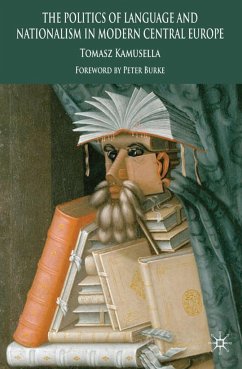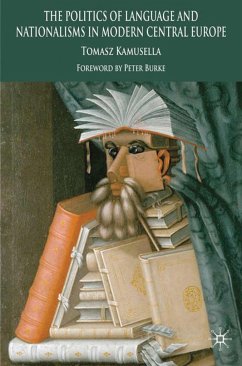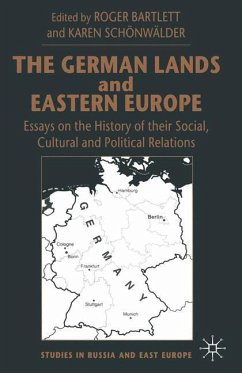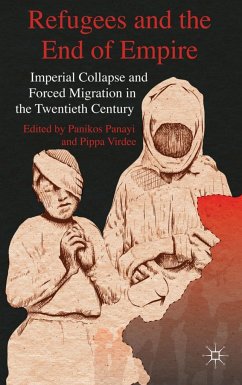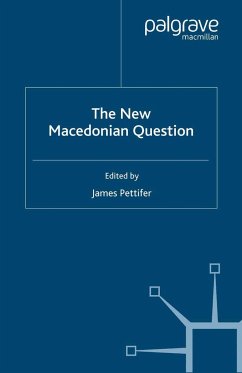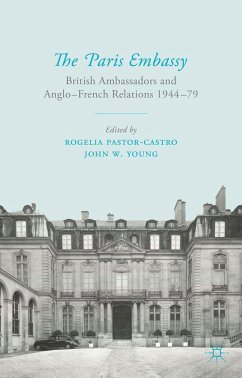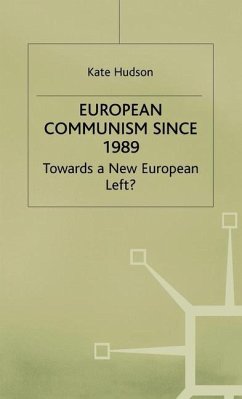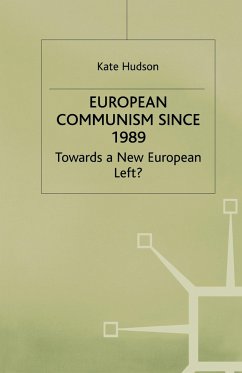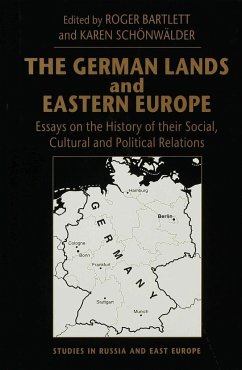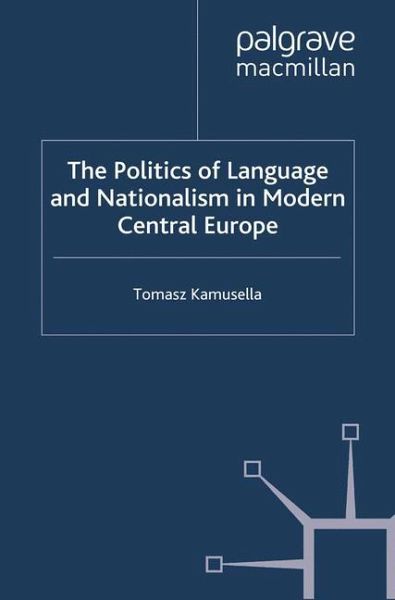
T. Kamusella
Broschiertes Buch
The Politics of Language and Nationalism in Modern Central Europe
Versandkostenfrei!
Versandfertig in 1-2 Wochen
Weitere Ausgaben:

PAYBACK Punkte
65 °P sammeln!





This work focuses on the ideological intertwining between Czech, Magyar, Polish and Slovak, and the corresponding nationalisms steeped in these languages. The analysis is set against the earlier political and ideological history of these languages, and the panorama of the emergence and political uses of other languages of the region.
TOMASZ KAMUSELLA is Senior Lecturer at the University of Opole, Poland, and focuses on the issues of language politics, nationalism, ethnicity, and European integration. Recent books include Silesia and Central European Nationalisms and (co-edited in two-volumes) Nationalisms Across the Globe. In 2002-2006, he researched this new monograph, The Politics of Language and Nationalisms in Modern Central Europe, at the European University Institute, Florence; the John W Kluge Center at the Library of Congress, Washington DC; the Institute for Human Sciences, Vienna; and the Herder-Institut, Marburg, Germany.
Produktdetails
- Verlag: Macmillan Education / Palgrave Macmillan UK / Springer Palgrave Macmillan
- Artikelnr. des Verlages: 978-1-349-36196-0
- 1st ed. 2012
- Seitenzahl: 1172
- Erscheinungstermin: 1. Januar 2012
- Englisch
- Abmessung: 235mm x 155mm x 63mm
- Gewicht: 1762g
- ISBN-13: 9781349361960
- ISBN-10: 1349361968
- Artikelnr.: 45073910
Herstellerkennzeichnung
Springer-Verlag GmbH
Tiergartenstr. 17
69121 Heidelberg
ProductSafety@springernature.com
'Kamusella has produced a magisterial study, ambitious in its aims but supported by original research as well as offering a synthesis of specialized contributions in a number of languages. The concepts it uses and the conclusions it reaches about
language and politics can be expected to provoke a more general discussion. It is likely to remain the standard work in its field for a generation.' - from the Foreword by Peter Burke, Emeritus Professor of Cultural History, University of Cambridge, UK
'Truly extraordinary is the author's detalied command of history, philology, and the national languages involved in this study. For those seeking information on language modernization in Central Europe or on case studies on the
language and politics can be expected to provoke a more general discussion. It is likely to remain the standard work in its field for a generation.' - from the Foreword by Peter Burke, Emeritus Professor of Cultural History, University of Cambridge, UK
'Truly extraordinary is the author's detalied command of history, philology, and the national languages involved in this study. For those seeking information on language modernization in Central Europe or on case studies on the
Mehr anzeigen
politics of language, this book is an excellent choice.' - Patrick Heinrich, International Journal of the Sociology of Language
'A magnificent history of language politics...Kamusella's book is an illustration of its own core argument: scholarship on language serves social purposes. Every EU official and NGO activist who deals with East Central Europe should have this book to hand, and every graduate seminar on nationalism in the region should begin with it. It provides countless sound judgements, and dispenses with a tremendous amount of nonsense.' - Timothy Snyder, Times Literary Supplement
'Apart from being an exceptional academic achievement, the monograph is also a very powerful political statement. It is one of themost impressive, in-depth arguments for the relevance of the study of Central Europe as a historical region... The book should certainly be received favourable by Anglophone students of Central and Eastern Europe, who would find this text a must-read in decades to come. In the English-speaking academic world, it is most likely to be used as an essential reference work that provides a broad - and yet in-depth - overview of the region's cultural, linguistic and historical landscape.' - Balázs Apor, AB Imperio
'This is a fine and invaluable study. We must be grateful to Kamusella for his meticulous scholarship and to Palgrave Macmillan for publishing a book with more pages than I have been allowed words to review it.' - Bernard Spolsky, Language Policy
'A magnificent history of language politics...Kamusella's book is an illustration of its own core argument: scholarship on language serves social purposes. Every EU official and NGO activist who deals with East Central Europe should have this book to hand, and every graduate seminar on nationalism in the region should begin with it. It provides countless sound judgements, and dispenses with a tremendous amount of nonsense.' - Timothy Snyder, Times Literary Supplement
'Apart from being an exceptional academic achievement, the monograph is also a very powerful political statement. It is one of themost impressive, in-depth arguments for the relevance of the study of Central Europe as a historical region... The book should certainly be received favourable by Anglophone students of Central and Eastern Europe, who would find this text a must-read in decades to come. In the English-speaking academic world, it is most likely to be used as an essential reference work that provides a broad - and yet in-depth - overview of the region's cultural, linguistic and historical landscape.' - Balázs Apor, AB Imperio
'This is a fine and invaluable study. We must be grateful to Kamusella for his meticulous scholarship and to Palgrave Macmillan for publishing a book with more pages than I have been allowed words to review it.' - Bernard Spolsky, Language Policy
Schließen
Für dieses Produkt wurde noch keine Bewertung abgegeben. Wir würden uns sehr freuen, wenn du die erste Bewertung schreibst!
Eine Bewertung schreiben
Eine Bewertung schreiben
Andere Kunden interessierten sich für




